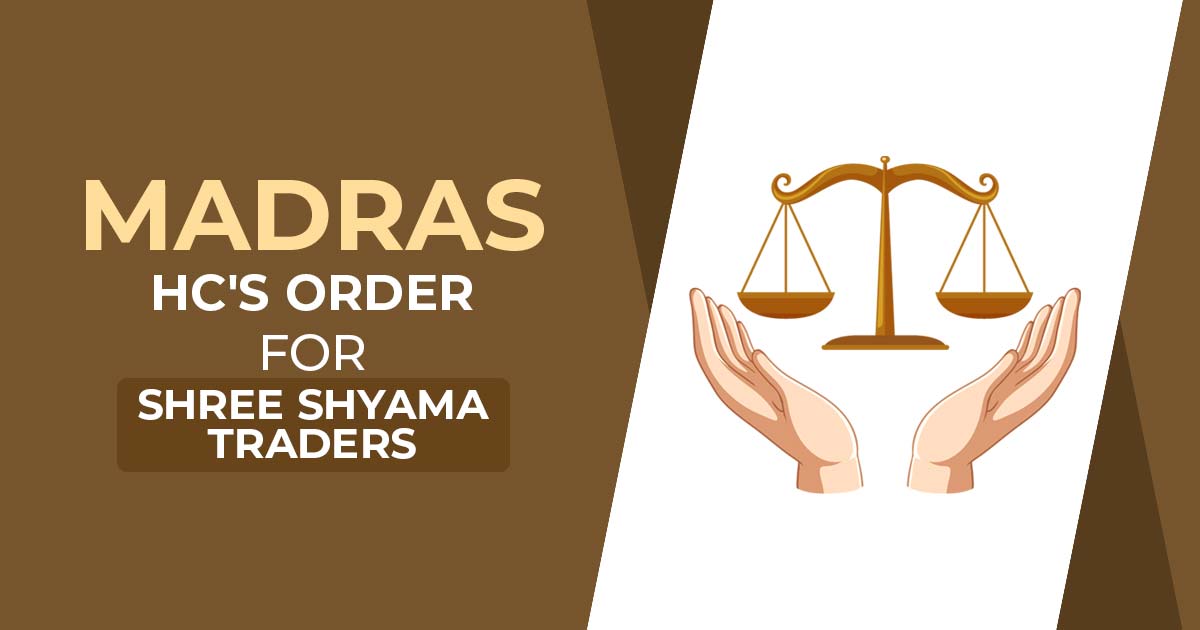
In a ruling, on the importance of procedural fairness in tax assessments, the Madras High Court has set aside an assessment order against Shree Shyama Traders, arising from an issue towards Input Tax Credit (ITC) reversals and a consequential bank attachment order.
The same decision, dated back to the proceedings begun in 2023, emphasizes the role of the judiciary in ensuring that assessees are provided a chance to present their case before any adverse orders are passed against them.
Case Specifics
Shree Shyama Traders encountered difficult circumstances when it came to know that an assessment order issued dated 11.08.2023, along with a following bank attachment order on 18.11.2023, was founded on an alleged failure to reply to notices that the applicant availed never to have obtained. This low learning prevented the applicant from showing its case, concerning the Input tax credit claimed from suppliers.
Court’s Observation by the Court
The court paid attention to the contention of the petitioner that it had not engaged in transactions with one of the suppliers, Mahamaya Ispat (a division of Abhishek Steel Industries Limited), which claimed to have issued credit notes leading to the ITC reversal.
The inability of the applicant to place this critical information on record, as the applicant is clueless about the tax department’s proceedings, created the basis of the decision of the court to remand the case for reconsideration.
Effects on Law and Taxpayer Rights
The very ruling is a reminder of the important balance between the duty of the tax department to collect the revenue and the right of the taxpayer to a fine hearing.
The decision of the court to quash the order of assessment and remand the case for new consideration shows the importance of ensuring that all the pertinent information and the arguments are deemed before attaining a decision that affects the assessees.
High Court’s Decision for Shree Shyama Traders
After the order of the court, a chance is been allocated to the Shree Shyama Traders to submit a reply to the show cause notice within 2 weeks of receiving a copy of the court’s order.
The tax department is asked to furnish a reasonable chance for the applicant, along with the personal hearing, before furnishing a fresh assessment order. This process confirms that the contentions of the applicant are evaluated, securing their rights and interests.
Closure: The ruling of the Madras High Court in favour of Shree Shyama Traders serves as a precedent for the tax council and assessees alike, specifying the requirement for clarity, communication, and fairness in the process of assessment.
It shows the role of the judiciary in securing the rights of the assessee and confirming that justice is served via procedural fairness. As the case is remanded for reconsideration it opens a new chapter for Shree Shyama Traders to ease the misunderstandings and present its case, through the expectancy of a favourable consequence in the reassessment proceedings.
| Case Title | M/s.Shree Shyama Traders Vs The Assistant Commissioner |
| Citation | W.P .N o.3967 of 2024 W.M.P.Nos.4283, 4284 & 4286 of 2024 |
| Date | 21.02.2024 |
| For Petitioner | Mr.P. Rajkumar |
| For Respondent 1 | Mr.C. Harsha Raj, AGP |
| Madras High Court | Read Order |